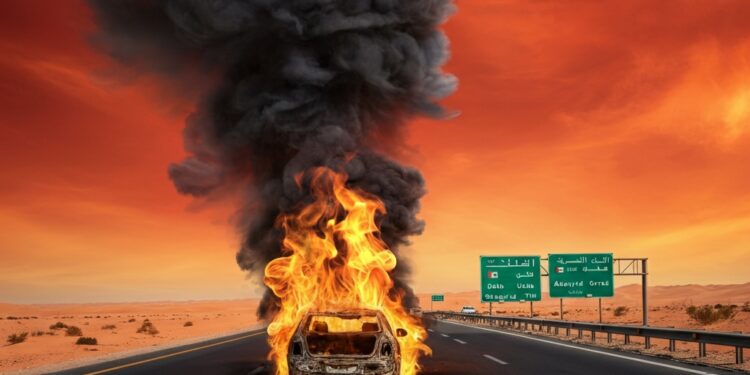As scorching summer temperatures continue to grip the Emirates, vehicle fire risks are climbing to alarming levels. In response, Abu Dhabi Police has rolled out a “Safe Summer” campaign to raise awareness and enforce essential safety practices — most notably, the mandatory presence of fire extinguishers in all vehicles.
Why Summer Poses a Serious Risk for Car Fires in the UAE
The extreme UAE summer heat places tremendous strain on vehicles. With temperatures regularly exceeding 50°C, cars are increasingly vulnerable to spontaneous fires caused by overheating, fuel leaks, or electrical failures.
A 2024 report from the UAE’s Ministry of Interior revealed that 43% of vehicle fires were directly linked to high ambient temperatures. In 2023 alone, over 2,189 car fire incidents were reported across Abu Dhabi and Dubai — most of them occurring during the peak summer months.
Safe Summer” Campaign: Key Objectives & Safety Guidelines
The General Command of Abu Dhabi Police launched the Safe Summer initiative to help protect lives and reduce fire-related emergencies. It emphasizes public education, preventive maintenance, and strict safety compliance.
📋 Essential Guidelines for Drivers:
-
Do not leave flammable objects like gas cylinders, pressurized sprays, or power banks inside your vehicle.
-
Perform regular vehicle maintenance, especially before long-distance travel.
-
Keep a fire extinguisher and a first-aid kit in your car at all times.
-
Follow all road safety laws to reduce the chance of collision-induced fires.
These measures not only comply with current regulations but are vital for your personal safety and the protection of others on the road.
Six Items You Should Never Leave in Your Car
The UAE Ministry of Interior’s Forensic Evidence Department has listed six items that should never be left inside a parked car — especially during hot weather:
-
Pressurized containers (aerosols, deodorants, sprays)
-
Batteries and power banks
-
Hand sanitizers (alcohol-based)
-
Perfumes
-
Gas cylinders
-
Lighters
Exposure to high temperatures can cause these items to explode or ignite, turning your car into a dangerous fire zone.
Common Causes of Car Fires in the UAE
Car fires are often sudden, but most stem from avoidable mechanical or user-related issues. The most frequent causes include:
🔌 1. Electrical System Failures
Frayed wires, short circuits, and overloaded battery systems can cause sparks that ignite fuel or plastic components.
⛽ 2. Fuel Leaks
Leaking petrol or diesel is extremely flammable. If it comes into contact with hot engine surfaces, the risk of combustion increases significantly.
🌡️ 3. Engine Overheating
Poor cooling systems or lack of regular oil changes can cause the engine to overheat and catch fire — especially during high-speed or long-distance driving.
🚗 4. Accidents & Collisions
Crashes can rupture fuel lines or damage electrical wiring, leading to fire outbreaks.
🔥 5. Exhaust System Failures
Overheated exhaust pipes or catalytic converters may ignite oil residues or flammable objects nearby.
🛠️ 6. Unsafe Car Modifications
Installing uncertified or incompatible parts can stress your car’s systems and increase the risk of fire.
✅ Top 10 Summer Car Fire Prevention Tips
With temperatures reaching extreme highs, fire prevention must be part of every motorist’s routine. Here are 10 safety tips to help avoid vehicle fires this summer:
-
Inspect fuel lines and tanks for leaks or corrosion regularly.
-
Check your battery and electrical wiring for wear or fraying.
-
Maintain correct tire pressure to avoid overheating and blowouts.
-
Never store flammable items inside the car, especially in direct sunlight.
-
Ensure your radiator and coolant system are working efficiently.
-
Avoid long, high-speed drives during midday hours.
-
Turn off your engine while refueling. Do not smoke near gas stations.
-
Keep a certified fire extinguisher within reach inside your vehicle.
-
Park in shaded or covered areas to lower internal temperatures.
-
Respond immediately to burning smells or smoke by stopping the vehicle and exiting safely.
🧯 Fire Extinguishers Are Now a Legal and Safety Must
According to the Abu Dhabi Civil Defense Authority, all vehicles must now carry a car-appropriate fire extinguisher as part of legal compliance and personal safety.
Fire extinguishers are not only useful during emergencies — they’re lifesaving tools that can help control small fires before they escalate into full-blown disasters.
✔️ Legal Requirement
Carrying a fire extinguisher is no longer optional. Failing to have one during inspection or traffic stops may result in fines or warnings.
🔍 Choosing the Right Car Fire Extinguisher
Not all extinguishers are created equal. When selecting one for your car, consider the following:
🔥 Types of Fire Extinguishers:
-
ABC Dry Powder Extinguisher – The most versatile; suitable for flammable liquids, electrical fires, and general materials.
-
CO₂ (Carbon Dioxide) Extinguisher – Best for electrical fires; leaves no residue.
-
Foam Extinguisher – Suitable for liquid-based fires like petrol.
📦 What to Look For:
-
Size: 1–2 kg is sufficient for most cars.
-
Mounting Bracket: Must be easily accessible, ideally near the driver’s seat.
-
Expiry Date: Check the label and ensure regular pressure checks.
-
Storage Location: Avoid storing in the trunk; it should be reachable during emergencies.
🚘 Where to Store It?
Install the fire extinguisher:
-
Under the front seat
-
Inside the glove compartment
-
On the center console side panel
Avoid placing it in the trunk — it’s difficult to reach during a fire.
🛡️ Final Word: Fire Safety Is a Shared Responsibility
With rising temperatures, increased road activity, and extreme weather patterns, the risk of vehicle fires in the UAE is real and rising.
By following the Safe Summer guidelines, equipping your car with a certified fire extinguisher, and avoiding risky behaviors (like leaving lighters or sanitizers in the car), you are protecting not just yourself — but your passengers and other road users too.
🔗 Stay updated with the latest safety campaigns, traffic alerts, and weather news at Desert Feed





